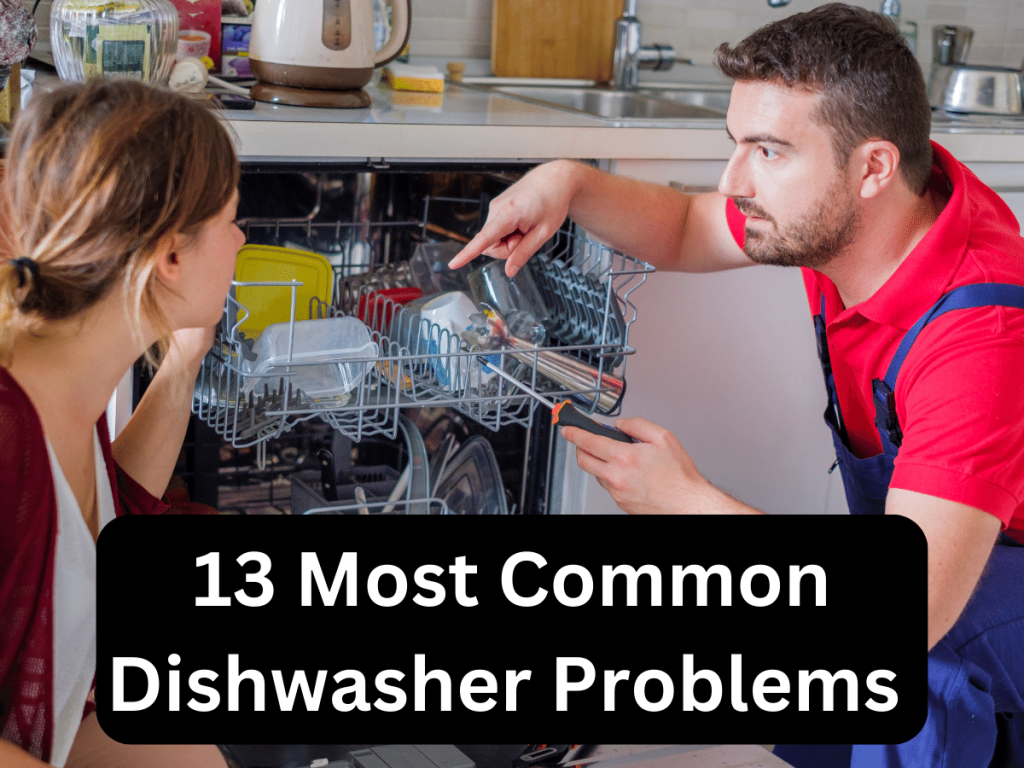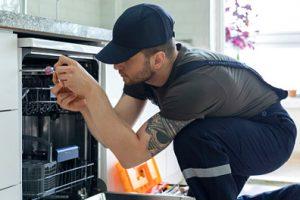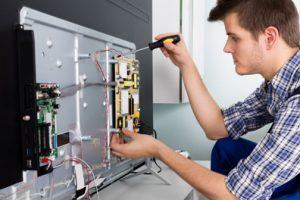The dishwasher is one of the most essential appliances of any modern kitchen, which save time and effort that can be used to perform any other joyous task. As with any other appliance, the dishwasher may experience maintenance problems. This blog post will discuss some common dishwasher problems and simple solutions.
1. My dishwashing machine is not draining
The failure of a dishwasher to properly drain after a wash cycle is a typical complaint. Water pooling at the bottom of your dishwasher might indicate a blocked filter or obstructed hose. Here are several solutions to try:
- To turn off the machine, unplug it.
- Check the dishwasher’s filter for any debris or food remnants and clean it thoroughly.
- Inspect the drainage hose for kinks or blockages, removing any obstructions.
- Reconnect the hose and run a short cycle to ensure the dishwasher drains properly.
2. Dishwasher Is Clogged
A clogged dishwasher can lead to water backup and poor cleaning performance. Follow these tips to fix this issue:
- To make sure the dishwasher drain is clear, remove the bottom rack.
- Use a soft brush or a cloth to clean the spray arms and remove clogs.
- Run a dishwasher cleaner through a cycle to eliminate any built-up residue.
3. My Dishwasher Is Leaking
Leaking dishwashers can cause water damage to your kitchen floor. To fix this issue:
- Check and ensure the door gasket for any signs of damage. Replace it if necessary.
- Inspect the dishwasher door and ensure it latches securely.
- Examine the water inlet valve and the pump for leaks and replace them if needed.
4. My Dishwasher Smells
Unpleasant odors emanating from your dishwasher can be bothersome. Here’s how to combat dishwasher smells:
- Clean the dishwasher’s filter regularly to prevent food debris from accumulating.
- Place a cup of white vinegar on the top rack and run a hot cycle to eradicate smells.
- To refresh the dishwasher, sprinkle baking soda in the bottom and run a brief cycle.
5. My Dishwasher Isn’t Cleaning My Dishes
If your dishwasher isn’t effectively washing your dishes, it might be because of:
- They need to overload the dishwasher, hindering water flow. Ensure dishes are spaced out appropriately.
- I was using expired or low-quality detergent. Invest in a reputable dishwasher detergent for better results.
- It clogged spray arms or nozzles. Clean them thoroughly to restore proper water circulation.
6. My Dishwasher Is Very Noisy
Loud noises during a dishwasher cycle can be unsettling. Here’s how to address this issue:
- Examine the spray arms for loose objects like cutlery or small plates.
- Verify that the dishwasher is leveled correctly to avoid unnecessary vibrations.
- Inspect the dishwasher’s motor and pump for any signs of damage or wear.
7. My Dishwasher Isn’t Drying My Dishes
If your dishes remain wet after the cycle, try the following solutions:
- Ensure you’re using a rinse aid to improve the drying process.
- Check the heating element for any defects and replace it if needed.
- Choose the “Heated Dry” option on your dishwasher if available.
8. My Dishwasher Won’t Start
If your dishwasher isn’t starting, consider these troubleshooting tips:
- Verify that the dishwasher is plugged in and the circuit breaker is not tripped.
- Check the door latch to ensure its functioning correctly and closing securely.
- Examine the control panel for error codes and follow the manufacturer’s instructions for resetting the dishwasher.
9. The Dishwasher Runs Too Long
If your dishwasher cycle takes longer than usual, try the following:
- Check that the water is sufficiently heated. The temperature should be approximately 120°F (49°C) for best performance.
- Use the appropriate wash cycle for your load size to avoid unnecessary extended cycles.
- Clean the filter and spray arms to maintain efficient water circulation.
10. No Soap is dispensed
When your dishwasher fails to dispense soap, consider these solutions:
- Check the soap dispenser for any blockages or residue and clean it thoroughly.
- Ensure you’re using the correct detergent for your dishwasher.
- If using detergent pods, place them in the bottom of the dishwasher away from the dispenser to prevent interference.
11. Food or Crumbs on the Dishes
Finding food particles or crumbs on your supposedly clean dishes can be frustrating. Try the following tips:
- Scrape excess food from dishes before loading them into the dishwasher.
- Check the spray arms and nozzles for clogs preventing proper water flow.
- Avoid overloading the dishwasher, as it can hinder water and detergent distribution.
12. Buttons Don’t Work
If the buttons on your dishwasher control panel aren’t responding, try these steps:
- Disconnect the dishwasher from power for a few minutes, then reconnect it to reset the control board.
- Ensure the control panel is not locked. Refer to the owner’s user manual for instructions on unlocking it.
- If the issue persists, contact a professional repairer to diagnose and repair the control panel.
13. Flashing Lights
Flashing lights on your dishwasher can indicate various issues. Follow these tips.
- Refer to your dishwasher’s user manual to interpret the flashing light codes.
- Perform the recommended troubleshooting steps provided in the manual for each specific code.
- If you need help to resolve the issue, seek assistance from a qualified technician.
Call the Professionals for Help with Common Dishwasher Problems
While many dishwasher problems may be resolved by do-it-yourself solutions, specific, more complicated issues may need expert assistance. If you experience problems that you cannot handle or are worried about the troubleshooting procedure, don’t be afraid to call a certified dishwasher repair professional.

Common Dishwasher Problem FAQs
Q1. How often should I clean my dishwasher’s filter?
A1. Cleaning the dishwasher filter every 2-4 weeks can help maintain its efficiency.
Q2: Can I use regular dish soap in my dishwasher?
A2. No, regular dish soap can create excessive suds and damage your dishwasher. Use only dishwasher-specific detergent.
Conclusion
Fixing the common dishwasher problems (discussed in this article) increase the lifespan of your appliance. Try to build a habit of daily cleaning your dishwasher, and you’ll see positive changes in performance. Fix minor issues by following the manufacturer’s guide or use this article for the best results, and don’t worry about asking for help if needed. Have fun washing dishes!







